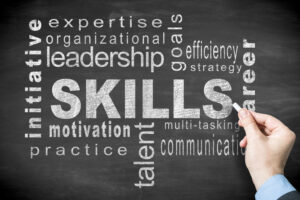Written by Scott Wilson

Strong leadership skills in the hands of people who know how to apply them have the power to steer the course of history. Hypatia of Alexandrea establishing an almost unimaginable precedent in her time as the leader of the Neoplatonist school of philosophy… King Leonidas holding the pass at Thermopylae… Martin Luther King Jr. firing up the American Civil Rights movement… Winston Churchill holding the United Kingdom together through the darkest moments of the Blitz.
Yet the mystery of effective leadership skills has eluded scholars and historians for nearly as long as records of these historical accounts have been kept. Examples of leadership skills identified from different eras are sweeping in their range, and sometimes contradictory in their conclusions. Are leaders made by birthright, like the kings and queens of old? Are they forged in a crucible of hardship, like the Spartans? Are they endowed with superior qualities at birth, destined for greatness?
The word leadership itself only dates back to the mid-1800s as a concept. But ever since people have been trying to identify the leaders who would be capable of pulling society together, setting a course, and pushing the collective toward greatness, everyone seems to recognize that leadership requires a certain something – a set of qualities and skills that are very rare and hard to quantify.
It’s really only since the early 20th Century that research, theory, and experimentation have drilled down into what exactly that certain something is. Collectively, the pros call these leadership skills. And they are the object and goal of organizational leadership studies.
What Are Some Examples of Leadership Skills?

For a long time in the history of studying leadership, it basically boiled down to the idea that you would know it when you saw it. Although organizational leadership has elevated leadership skill development way beyond that, it still involves a lot of case studies and examples of leadership in action.
Different leaders offer up different lessons in leadership skills. It’s rare to find anyone who has the perfect touch in every single skill.
But look to Leonidas for strategic thinking and innovation. Chosen by the Hellenic Alliance to lead a hastily assembled force to block and delay the massive invasion force of the Persian Empire, Leonidas chose the strategic bottleneck of Thermopylae, and held back as many as 300,000 invaders with only 7,000 men for three days.
And pick Martin Luther King, Jr, for superb work in diversity and inclusion. King knew it was impossible for minority Black populations to create conditions for equality on their own. So he cultivated white allies throughout his civil rights crusade… and changed the country.
If understanding strategic communications is on the menu, there’s no better subject to study than Churchill. A master of both the written word and oratory, his radio addresses to the United Kingdom fired up a population to endure battle and bombings… while his private communication to allies secured war materials and support to keep up the fight.
Why Effective Leadership Skills Deserve Their Own Focus in College Studies
All that research and exploration of what makes a leader has delivered some concrete results. We know now that you don’t have to be born with all the right traits—although character is important. You don’t have to be blessed by the gods—although luck may be a factor. And you don’t have to suffer and strive—although ambition and empathy are both key.
It turns out that leadership skills can be taught. And you can learn them through studies in organizational leadership.
Organizational leadership isn’t a profession; it’s a discipline, one that has valuable uses in almost every job and industry.
You can see that reflected in many kinds of OL degree programs, which can come in various specializations that revolve around how to develop leadership skills in a specific profession. Nursing, engineering, or even hospitality and hotel management have particular focus areas for training effective organizational leaders.
Organizational leadership studies are an interdisciplinary field that takes in knowledge and expertise from areas as diverse as labor relations and organizational psychology.
But all these diverse examples of leadership skills don’t just stand alone. The key concepts and techniques they come with are interdependent. Becoming an elite strategic thinker without inclusion skills or communications will lead you right up the corporate ladder to your mom’s basement. Great leaders are the ones who bring all the effective leadership skills together.
That’s why the core list of leadership skills can each be worth studying in their own right. They bring fresh perspectives and valuable lessons that can be applied in almost any industry and any situation managers, directors, and administrators might encounter. They offer a way to cover a weakness you know you have in that area, or a way to double down on your particular strength. Just having the options on the menu can inspire fresh perspectives.
So it’s sometimes better to think of an organizational leadership degree less as learning a job than as a master class in how to improve leadership skills themselves. And that can pay dividends in any kind of job, across the board.
Leadership Skills Examples Can Be Seen At the Echelons of Every Profession You’ll Find
 Where exactly can specialized studies in top leadership skills take you? That’s up to you and the industry you make your career in, but there’s one thing for certain: you’re aimed right at the top of the ladder in whatever field that is.
Where exactly can specialized studies in top leadership skills take you? That’s up to you and the industry you make your career in, but there’s one thing for certain: you’re aimed right at the top of the ladder in whatever field that is.
Leaders lead. It’s their defining characteristic. There’s no substitute, no faking it. So it’s inevitable that developing the right leadership skills will help take you to the front of the pack in any field you happen to be in.
That can look very different from industry to industry, though. A titan of global manufacturing will send you up to the C-suite in a Fortune 500 corporation; as a nurse working in a vital management position in a rural hospital, you may take those same skills and put them to use leading a small team to offer critical care to a small but grateful population without other options.
Those roles will obviously differ a lot in the nature of the work and the compensation they provide. Where they are exactly the same is in the demands they will put on your leadership skills and on the importance they hold in the organizations you work for.
Leadership Skills Boost Compensation Levels
 Because of that broad range of jobs that you might master with these skills, there’s an equally wide range of salaries they may bring you. But like your career path in any industry, you can expect leadership roles to take you toward the top of whatever range that is.
Because of that broad range of jobs that you might master with these skills, there’s an equally wide range of salaries they may bring you. But like your career path in any industry, you can expect leadership roles to take you toward the top of whatever range that is.
For the most general example, you can take a look at the Bureau of Labor Statistics (BLS) category for Top Executives. In 2021, the top ten percent, of executives brought home more than $208,000 annually, pushing past the limit of the Bureau’s reporting threshold. And the real number is likely much higher—BLS stops counting at $208,000, but that doesn’t mean that salaries stop there!
Tack on benefits and bonuses and seven figures aren’t out of the question.
But there’s also a kind of compensation that comes with strong leadership skills that isn’t financial, and that money can’t buy. That’s respect. And when you have it in your field, it’s more valuable than gold.
A Leadership Skills List To Start Off Your Organizational Leadership Studies
 Organizational leadership tells us that leadership skills can be taught. But what exactly are those skills? How do you learn them?
Organizational leadership tells us that leadership skills can be taught. But what exactly are those skills? How do you learn them?
In addition to the many kinds of organizational leadership degrees that offer a specialization in certain industries or fields of leadership, there are also degrees that let you dive into the well of leadership skills training in any of these sub-disciplines.
Ultimately, everyone studying organizational leadership will find their own formula for how to develop leadership skills. You’ll come to understand where your strengths and weaknesses are. You’ll plan a program that shores up the soft spots and plays to your talents.
You may be able to polish up some of the most important leadership skills for your resume through organizational leadership concentrations in these areas.
The art of measuring employee, team, and organizational performance has always been important for leaders with complex objectives. Innovations in information technology have made this a complex skill, but a very important one to master in organizational leadership.
Organizations count on their leaders for insights into the nature and future of their industry and capabilities. The essence of strategic thinking brings together those insights with planning skills and a knack for innovating to allow more effective, more efficient, and often groundbreaking approaches to planning and management. It’s a skill that is tough to master but invaluable once you have it.
Strength in diversity is a watchword in leadership studies, but it’s easy to say it and hard to cultivate the kind of inclusiveness and respect to truly implement. An organizational leader that focuses on honoring diversity and strengthening inclusiveness is one that any modern business or agency will value.

Organizational leadership places a strong emphasis on leading by supporting your team. The skill that allows you to actually provide that kind of support lies in training and development. These concentrations help you develop the best practices for evaluating staff, designing training programs that align with both their needs and those of the organization, and deploying them to elevate both the individuals and your organization as a whole.
Conflict is inevitable in any organization, and a large part of the role of leaders is in managing that conflict. Learning how to mediate between diverse points of view and to resolve issues to the satisfaction of all parties, while still bringing about the best conclusion for the company, is the objective of training in this leadership skill.
As the skill that every other leadership skill rests on, communication is an essential part of all OL studies. But specialists in strategic communication develop expertise not just in what and how to get their point across, but also to do it in the best possible way to serve the overall mission of the organization.
Organized labor is making a comeback in the United States. Painful conflicts at big employers like Amazon and Starbucks are making clear how far the state of labor relations skills has fallen in American organizational leaders, and specializations in the art of managing employer-employee relationships are designed to correct that failing. Understanding different perspectives, cultivating interpersonal relationships, complying with labor law, and handling negotiations are all a part of this kind of OL concentration.
Direct supervision of teams and overseeing the day-to-day operations of any organization takes a special blend of institutional and domain expertise with effective interpersonal leadership skills. That’s the knack that this type of OL concentration can give you, tying your individual experience and expertise in your industry with the day-to-day management practices of accounting, oversight, governance, and basic on-the-ground decision-making to keep operations ticking smoothly.

If it wasn’t clear enough before the pandemic, it is now: remote staff and virtual organizations are about to become the norm, not the exception. But many of the tried and true practices leaders have been using for centuries go out the window when they are located ten time zones away from the staff they lead. This new kind of leadership skill to develop is sure to be a valuable and fast-growing field for those who can master it.
Setting the tone and building a culture of respect, achievement, and excellence is a large part of the way that leaders of large organizations impact performance. The fine art of developing organizational culture through ethical, encouraging, and visionary leadership is worth its own specialized course of study, which helps cultivate cultural leadership skills that span industries and fields.
Much of the revolution in organizational leadership theory and practice has come courtesy of new insights and research into the psychology of individuals in social and organizational contexts. Understanding how people behave differently with relation to one another and how they react to pressures and cultural forces in groups and business contexts is a key skill for applying other organizational leadership principles.
You can’t have effective project management without strong organizational leadership. It’s a domain that pulls together nearly all other skills in organizational leadership in some way – from the psychological elements behind bringing specialized teams with unique characteristics and work cultures together to the ability to communicate the needs of each contributor to create a coherent and cohesive workflow. Organizational leadership degrees in this area combine strong people-handling and team-building skills with the basic talents of resource management and scheduling.
There are many vital leadership skills to develop, and every organizational leadership degree will incorporate lessons from each of these areas. But opting for a specialization in any of these fields opens up a range of both academic and operational leadership roles where you can bring your A-game to play.
How To Develop Leadership Skills at Different Stages of Your University Education and Career
 While every career path is different, just about every kind of leadership job today means earning a college degree. All the top leadership skills have a wealth of foundational knowledge and research behind them. You can’t just absorb that on the job—formal study under the instruction and mentorship of a professional teacher is really the only way to get them down cold.
While every career path is different, just about every kind of leadership job today means earning a college degree. All the top leadership skills have a wealth of foundational knowledge and research behind them. You can’t just absorb that on the job—formal study under the instruction and mentorship of a professional teacher is really the only way to get them down cold.
Fortunately, you can get that kind of guidance no matter where you stand on the ladder of experience and expertise right now. Organizational leadership skills training at the college level comes in all shapes and packages—one or more of them will fit your goals.
Bachelor’s Degrees with a Focus in Specific Organizational Leadership Skills
On the ground floor, a four-year bachelor’s degree offers both the general knowledge and critical thinking skills required of any professional position in business or government today, plus the specialized leadership skill development to put you on the fast-track to management.
Master’s and MBA Degrees with a Focus in Specific Organizational Leadership Skills
Graduate degrees in leadership skills typically take only a year or two to complete. But they also bring you a level of study and mastery of the concept you can’t get anywhere else. The focused studies in these programs let you break new ground in both the field and in your own thinking and leadership style, making them an excellent choice for anyone polishing up a resume and skillset for executive positions.

Doctoral Degrees with a Focus in Specific Organizational Leadership Skills
At the doctoral level, you don’t really need to find a program with a leadership skill concentration right on the label. These top-level programs, which can take between four and five years to complete, come with specialization baked right in. That’s because they are all about original thinking and research in the field. You’ll be required to pick a focus for your doctoral dissertation and put years of original thinking and investigation into it. These programs are primarily aimed at individuals looking to pursue academic or research-oriented careers in organizational leadership itself, but there is no higher level of expertise to develop.
Certificate Programs with a Focus in Specific Organizational Leadership Skills
Certificate programs may be the most common approach taken to mastering specific leadership skills. With a short course of study, only a few months at most, and a low price tag to match, they are among the easiest ways that current professional leaders can polish up their game. Since they have a limited scope, they can focus in-depth on exactly the king of skill you know you need to boost your leadership practice and career.
Online Studies Make It Easy To Get Leadership Skills Training From Anywhere
More and more of these programs are available not just in the traditional on-campus format, but also in flexible online and hybrid studies.
This makes it easy for leaders at every rung on the career ladder to find an option that fits both their work and their lifestyle. Non-traditional students have families to pay attention to and jobs to hold down. An online degree makes it easier to do both by allowing you to complete your assignments and check in with class at any hour, from any location.
Just as important, online options give you the chance to attend schools far from home. That means if you find the perfect fit for your leadership skill needs five states away, it’s no problem—it’s just as easy to attend as if it were a university right down the street.
How Developing Leadership Skills Can Give You an Edge in Both Work and Life
 You don’t have to think about it for very long before you come to understand that good leadership skills can be a valuable investment not just in the workplace, but in any aspect of your life.
You don’t have to think about it for very long before you come to understand that good leadership skills can be a valuable investment not just in the workplace, but in any aspect of your life.
Of course, making a living is a key consideration for anyone earning a degree that teaches leadership and management skills. But the leadership soft skills that come with OL studies aren’t things you leave at the door when you walk out of the office.
Instead, perfecting your understanding and performance in any of these areas can pay dividends in any aspect of your life. The same training and development skills you put to use on the factory floor at work can help build your kid’s soccer team into the envy of the neighborhood. A command of social and organizational psychology can get your local volunteer trail maintenance crew humming as they rebuild a favorite local path.
Leaders don’t stop leading once they clock out at work. Effective leadership skills are something that will transform your life as well as your career. And they start with a degree in organizational leadership.
2021 US Bureau of Labor Statistics salary and employment figures for Top Executives reflect national data, not school-specific information. Conditions in your area may vary. Data accessed January 2023.




